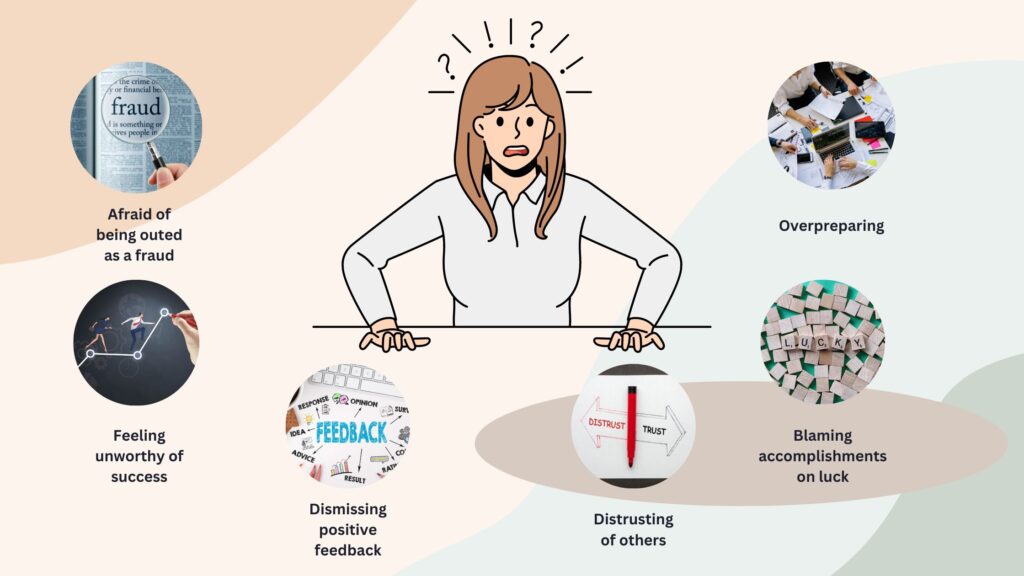Imposter syndrome refers to an internal feeling where you believe that you’re not as proficient as others perceive you to be. This definition is usually applied to intelligence and achievement. It links to perfectionism and the social context. People with imposter syndrome usually doubt their abilities. They feel they are not good enough to do the job they were hired to do. When you have this syndrome, you’re convinced you’re not as creative, intelligent and talented as you seem. And you think your success and achievements were obtained because of luck and good timing or being in the right place and at the right time.
Some of the habitual signs of the imposter syndrome include; the inability to pragmatically assess your skills and competence, assigning your success to external factors, self-doubt, laying down very demanding goals and feeling disappointed when you fall short, and the fear that you will not reach expectations.
For some people, the imposter syndrome can drive feelings of motivation to achieve, but this typically comes at a cost in the form of persistent anxiety. You might over-prepare or work harder than usual to ensure that no one finds out you are a fraud.
The problem with imposter syndrome is that the experience of performing well at something does not change what you believe. As you might sail through the performance, the thought still surfaces in your head. The more you achieve, the more you feel like a fraud; it’s like you can’t feel your experiences of success.
About 82% of people suffer from imposter syndrome, struggling with the feeling that they did not earn what they’ve achieved and are fraudsters. Usually, these feelings result in persistent anxiety, depression, career burnout and minimal risk-taking in careers.
Conquering imposter syndrome is not quite simple. As individuals play a significant role in overcoming the syndrome, it’s essential to remember that systems play an important part too. There are approaches designed to build resilience to imposter syndrome, as there are also reforms that need to be implemented to address equity. The problem isn’t a matter of the individual; it could be the culture or setting.
Here are ten approaches to how you can combat imposter syndrome, as discussed below.
Be aware of the signs.

Combating the imposter syndrome is not and will never be an effortless journey. Still, the end results will be very satisfying. You often fail to notice the signs and symptoms of imposter syndrome that surface in your day-to-day lives. However, recognising these signs is the first step toward combating this syndrome. Some of the signs include not accepting praise and feeling like you were lucky. Yet, you worked hard for that shit or held yourself to incredibly high standards.
Action Tip: Pay close attention to your language choices when talking to people and yourself, especially regarding working issues. When you find your success and the praise you get from others uncomfortable, reflect on where those thoughts are coming from and what they mean in your professional life.
Separate facts from feelings
There are high chances that you will feel imposter syndrome sliding in at some point in your life. When they do, be ready for those feelings, notice and be mindful of them and be prepared with a response. Like any other negative emotion, one of the best approaches to managing imposter feelings is to address the inaccurate thinking that contributes to them. Remember that just because you believe these feelings, it doesn’t imply they’re true. If your mind starts doubting the things you’re talking about, tell yourself that you clearly know and comprehend more than you think and are capable of learning more.
Action Tip: Start supporting a friend who minimises their accomplishments and success, then implement the same supportive language to your narration.
Let go of perfectionism.
You should get used to being uncomfortable. It’s impossible to grasp everything about programming, and not everyone knows everything about programming languages. Much as perfectionism is essential in particular contexts, it can be a blockade of productivity. Turns out that it can also be a significant barrier to overcoming imposter syndrome too. Most people who suffer from this syndrome are usually high achievers; they set incredibly high goals and standards for themselves and commit to pulling off their best. But perfectionism feeds into your imposter syndrome. When you feel like a fraudster, you are comparing yourself to a perfect result that is either impossible or unrealistic to meet. Holding yourself to such standards can be counterproductive, much as you may not realise it.
Action Tip: Try as much as possible to set realistic and achievable standards.
Track your success

Learning how to code is really a demanding process. Therefore when you achieve something, however small it may be, celebrate it. People with imposter feelings usually tend to brush off their successes, which only worsens the experience. When someone congratulates you for something, don’t ignore it and move on, but rather pay attention to how you respond and aim to speak more positively about yourself. As an imposter, one of the hardest things to learn is how much of a role you have played in your successes. Chances are that you might relate your success to luck or someone else’s hard work. Yet, in a genuine sense, your own work, knowledge and preparation should be given a round of applause. To help show that you are performing well, track all your wins in a private document.
Action Tip: You have to track your achievements and success as they happen. An application can be of great importance. Apps like Evernote can help you stay on top of your accomplishments. When you achieve something at work, open the app and note it down.
Share your failures
Listening to what fellow colleagues think of you is probably not the only way to get out of imposter syndrome. Discussing failures in a group can assist you in portraying a more realistic portrait of what other people are dealing with. Also, this helps you realise that you’re not the only one. Find a community where you share the same interests for support, and share with them some of the blockades you have faced on your coding journey. Am sure there’ll be someone ready to listen and help accordingly. These communities usually have tons of valuable information for disposal to beginners that you may want to try out.
Action Tip: Incorporate your failure story into the performance review process. Question each person to identify one failure they faced and how they moved forward. This will give you the courage to open up and narrate your story. You can turn your failure story into a podcast, social media post, or anything you’re comfortable with. It could also be a song.
Be Kind to yourself
Imposter syndrome usually emerges as a voice in your head and reproaches you with negative messages such as “You’re not smart enough, or you’re a fraud”. This negative self-talk is a terrible habit and can determine your stress and anxiety levels. Being kind to yourself implies alternating the way you talk to yourself in your head by practising positive self-talk. Being kind can mean getting enough rest, exercising and spending quality time with your family and friends. Not only does being kind to yourself minimise your stress levels, but it can also assist you in generating the courage to execute moves that will bring you extensive rewards.
Action Tip: Think about how you talk to the people around you and yourself, and avoid negative talks in your mind. Be conscious of your inner voice. This will help you pick up yourself.
Talk to your mentor
You should never, I repeat, never suffer in silence. Share your thoughts and experiences with someone, and you’ll be well-equipped to combat your imposter syndrome. Not many are lucky to have a kind and supportive team, but if you do, share these experiences and thoughts with your mentor or manager. A supportive mentor or manager puts you in a position where you can share your emotions without fear of being judged. Mentors and managers are very forthcoming about their struggles in their careers, and chances are that you’ll find some stories essential and helpful for how to deal with how you’re feeling. Talking to these people is critical as they possess the knowledge and tools to assist you in combating your imposter syndrome in the context of your current job.
Action Tip: Ask your mentor or manager to assist you in finding a system that tracks your success. Also, knowing what they know about you and your job helps you seek out more opportunities to shine and gain visibility on your team. Don’t be afraid to ask questions, even if it is a stupid questions.
Say yes to opportunities.
It’s impossible to be affirmative to everything, more so when stressed. But it’s ordinary for people suffering from imposter syndrome to reject career-boosting opportunities. It’s so because they believe they don’t do a good job. When an opportunity comes your way, cheerfully accept it with open hands. Always try to differentiate between the inner voice that says you’re not good enough; therefore, you can’t do it, and the one that tells you can’t do it because you have a lot of things going on. The former is your imposter syndrome communicating. Going up against demanding new work and performing well at it opens many doors for you. Therefore, don’t let your inner feeling of how you’re not good enough make you turn down these game-changing opportunities.
Action Tip: When someone offers you an opportunity, and you’re unsure whether you can do it, just accept it. Then learn how to do it later.
Embrace the feeling
It’s hard to get rid of the imposter syndrome ultimately, especially when it has been disturbing you for quite some time. The fact that massively successful people also feel the impact of the syndrome regardless of what they have accomplished is evidence that it can sometimes be a long-term condition. Therefore, don’t let imposter syndrome create a significant impact on your life and stop you from your goal of being a software developer. That’s why the best approach to tackle imposter syndrome is not by getting rid of it unconditionally but rather by just stopping it from hindering your success.
Action Tip: First, understand the value of what you bring to the table. Then present yourself as authentic and confident by concentrating on what makes you unique. This separates you from the competition and helps you stand out.
Conclusion
Keep in mind that impostor syndrome can arise at any point in your career, especially if the people you are surrounded by have different achievements. Therefore, when this syndrome occurs, utilise the aforementioned approach to combat it before it’s too late. Strategies include embracing your feelings, accepting new opportunities, and discussing them with your mentors, among others. Now that you know how to deal with this destructive syndrome, maybe you can extend a hand to a friend who needs one and help them overcome it.


